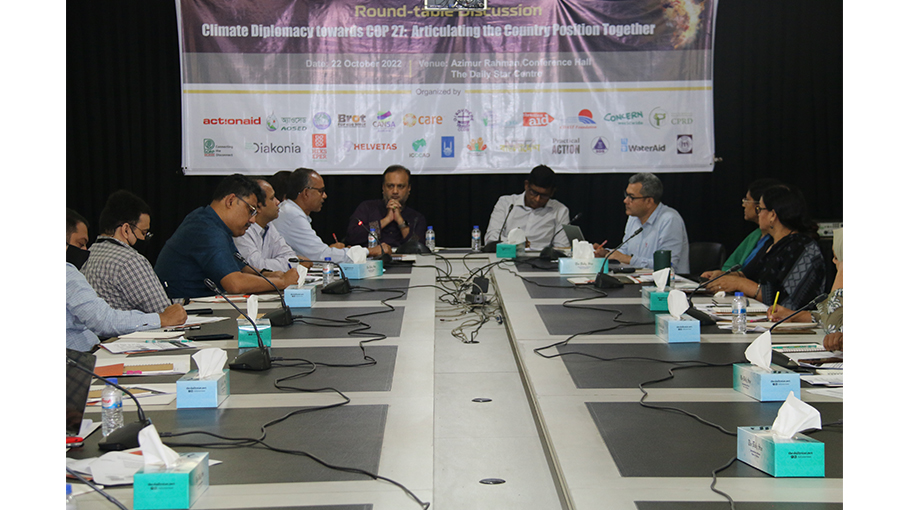Mechanism needed to compensate climate hit countries

Speakers at a roundtable discussion on Saturday said a formal mechanism is needed to provide compensation to affected countries due to impacts of climate change.
Aggrieved countries, including Bangladesh, should insist on fairness-based grants rather than showing interest in loan flows imposed by the developed world, they said while speaking at the discussion titled “Climate Diplomacy towards COP 27: Articulating the Country Position Together” held at the Daily Star Center in Dhaka.
Center for Participatory Research and Development (CPRD) and several other non-governmental development organizations organised the event to put forward recommendations to the government for placing them at the upcoming COP-27.
The 27th United Nations Climate Change Conference, commonly referred to as COP (Conference of the Parties of the UNFCCC), will be held from 6-18 November, 2022 in Egypt. CPRD’s Chief Executive Md. Shamsuddoha moderated the discussion and presented a keynote paper at the event.
He said, the developed countries are yet to carry out their duties and responsibilities for combating climate change. Without a remarkable increase in greenhouse gas emission reduction targets and implementation of those properly, the ‘horse of climate change’ cannot be bridled anymore.
“A scope of boosting the low flow of climate financing has stemmed from the urgency for reducing the ever-increasing adaptation gap and devising a formal mechanism for compensating the climate-induced losses and damages potentially affecting different regions and countries. In order to exploit the opportunities, Bangladesh should develop an integrated working strategy which can help CSOs contribute,” he added.
Mr. Doha stressed that $100 billion is, by no means, sufficient anymore. The present reality of climate change and its impacts warrants the fund to be no less than $1 trillion.
He also demanded the climate finances be solely grants-based, as the climate financing in the form of loans is another injustice on the already tormented countries. The developed countries are trying to bypass the UNFCCC process by offering some deals outside the UNFCCC umbrella, which may debilitate the focus and spoil long-earned achievements of the negotiations.
Exemplifying the climate-induced human rights violation in the southern coastal zone of Bangladesh, Mr. Doha also called for presenting the ground evidences of climate change-induced violation of human rights in the negotiations.
Tanvir Shakil Joy, Member of Parliament, said there is often lack of coordination between the government and the civil society, but the two stakeholders must come under the same umbrella on climate change issues.
He said, “Climate-induced migrants have become a great concern for us. We are raising voice from our side, but there is no promising initiative yet. There have been so many projects financed out of the climate funds, of which many instances indicate sheer wastage of money. Such wastage tarnishes the image of the country to the global community and will cause loss to the country in the long run.”
He also urged the stakeholders concerned to be more sensible in utilizing the project funds.
Barrister Shamim Haider Patwary, MP said, “The climate change negotiation is going on in an uncoordinated way, and the government should ensure a vibrant coordination among the civil society, policymakers, think-tanks, and other stakeholders. We are yet to present our issues and climate-induced L&Ds in an acceptable and scientifically authentic manner.”
He demanded a separate fund for the worst-affected countries, and he wants Bangladesh to play a leading role in this regard. He stressed that there should be an allied program among the CSOs; the parliamentarians also have to play their role, they should talk in the national assembly as well as outside it on the inputs coming from the civil society.
Dr. Fazle Rabbi Sadeque Ahmed, Deputy Director of PKSF said, there is a noticeable gap between the civil society and policymakers. Government officials often seem unwilling to reach out to the civil society.
Dr. Golam Rabbani, Head of Climate Bridge Fund, said, “We are still far away from establishing 50% of climate finances for adaptation. He also said that 70% of the finances at present are loans, putting a heavy burden of debt on the already indebted countries, and we should raise voice to reverse this practice.”
He also added that, though the developed world acknowledges climate change, they are not still admitting the impacts properly, which is clearly a double standard position.
Among others, Khodeja Sultana Lopa, Country Director of Diakonia Bangladesh, Rabeya Begum, Executive Director of SDS and Md. Arifur Rahman, Chief Executive of YPSA, also spoke at the event.




